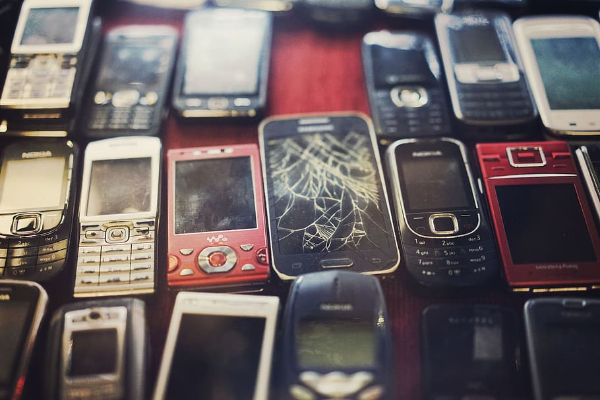In an age where technology is constantly evolving, and electronic gadgets seem to have a shorter lifespan than ever, mobile phone recycling emerges as a vital practice for the well-being of our planet. Recycling old mobile phones not only conserves valuable resources but also reduces greenhouse gas emissions associated with the production and disposal of electronic devices. This article sheds light on the importance of mobile phone recycling and its positive impact on the environment, as well as providing practical insights into how individuals can contribute to this essential cause.
The Growing E-Waste Challenge
The United Kingdom, like many developed nations, faces a growing problem with electronic waste or e-waste. E-waste includes discarded electronic devices, such as mobile phones, laptops, and tablets. Astonishingly, the average UK citizen generates approximately 55 pounds of e-waste annually, which is significantly higher than the European Union (EU) average. Despite EU directives on Waste Electrical and Electronic Equipment, the UK still has a long way to go in achieving its recycling goals for electronic devices.
Mary Creagh MP, Chair of the Environmental Audit Committee, aptly describes the situation as a “tsunami of e-waste.” Among the vast pile of e-waste, mobile phones form a significant portion, making it crucial to address this issue proactively.
Four Logical Reasons to Recycle Mobile Phones
- Energy Conservation: Recycling just one mobile phone can generate enough energy to power a laptop continuously for 44 hours. This efficient use of resources reduces the need for additional energy production, which often relies on fossil fuels and contributes to greenhouse gas emissions.
- Energy Harvesting Potential: If all 130 million mobile phones discarded annually in the UK were recycled, the recovered energy could provide electricity for 24 homes for an entire year. This illustrates the immense potential for energy harvesting through responsible recycling practices.
- Precious Metal Recovery: Inside each million recycled mobile phones, there is approximately 75 pounds of gold, 772 pounds of silver, and 33 pounds of aluminum. These valuable metals can be recovered and reused, reducing the need for environmentally destructive mining and resource extraction.
- Environmental Protection: Mobile phones contain toxic components that can pollute groundwater, air, and soil if disposed of in landfills. Recycling prevents these harmful substances from contaminating the environment, preserving the health of ecosystems and safeguarding human health.
Donation as an Alternative
While recycling is an ideal choice for old mobile phones, another option is donation. Many individuals upgrade their mobile phones every 18 to 24 months, leaving them with older devices that still function. Instead of allowing these phones to gather dust or disposing of them carelessly, consider donating them to programs that provide essential technology to low-income communities. Some recycling programs collaborate with local organizations and schools to collect unused cell phones as part of fundraising initiatives.
Tech giants like Apple also actively participate in recycling efforts. They accept older iPhones for recycling and reprocess them through refurbishment programs. In 2015 alone, Apple recycled 90 million pounds of waste, including plastics, steel, glass, aluminum, silver, and gold. These recycling efforts not only reduce environmental impact but also promote the responsible use of resources.
It’s important to note that the impact of mobile phone recycling extends beyond national boundaries. By sending refurbished devices to developing nations, recycling programs enable communities that cannot afford the latest technology to access modern communication tools, fostering social and economic development.
Health Benefits of Recycling
The toxic components present in mobile phones pose not only environmental hazards but also significant health risks to both humans and animals. Lead, for example, is known to cause cancer and impair cognitive function in the human body. Mercury exposure can result in memory loss, sensory impairments, and muscular weakness in animals. By recycling mobile phones and preventing these toxic substances from entering landfills, we protect both environmental and human health.
The Recycling Process
Recycling organizations often prefer to recycle older mobile phones in developing countries to ensure that these devices do not end up in landfills prematurely. The recycling process typically involves the following steps:
- Disassembly: Mobile phones are disassembled to recover various components, including aerials, LCD displays, printed circuit boards, screws, microphones, speakers, and battery connectors.
- Chemical Processing: The disassembled components undergo chemical processing to extract valuable metals efficiently.
- Smelting: The extracted metals are then sent to smelters, where they are purified and prepared for reuse in manufacturing.
A quick internet search can provide a list of companies in the United Kingdom that specialize in recycling mobile phones and electronic devices.
Taking Responsibility: A Collective Effort
Storing old phones in offices or homes and eventually forgetting about them is a common practice that needs to change. This complacent behavior contributes significantly to the growing e-waste problem. To address this issue effectively, governments, civic societies, and individuals must take collective responsibility.
Awareness programs should be established to educate the public about the long-term and irreversible effects of e-waste on human health and natural diversity. Every individual has a role to play in reducing and eventually eliminating e-waste by choosing to recycle their mobile phones and electronic devices.
In today’s world, we are all stewards of the planet, and each of us bears a responsibility to minimize our environmental footprint. Mobile phone recycling is a practical and impactful way to contribute to a greener planet, conserve valuable resources, and protect the health of both our environment and ourselves. By making informed choices and embracing responsible recycling practices, we can create a more sustainable and eco-friendly future for generations to come.

